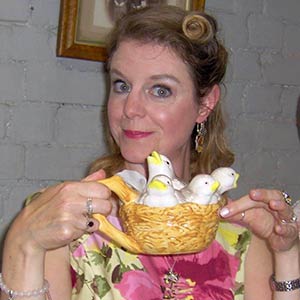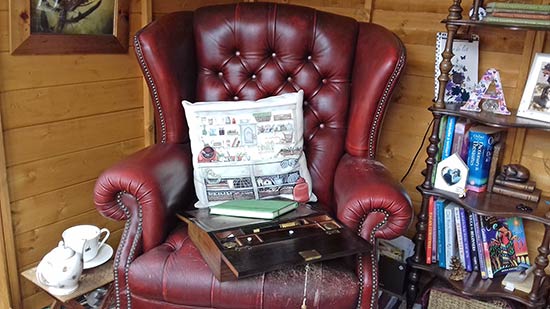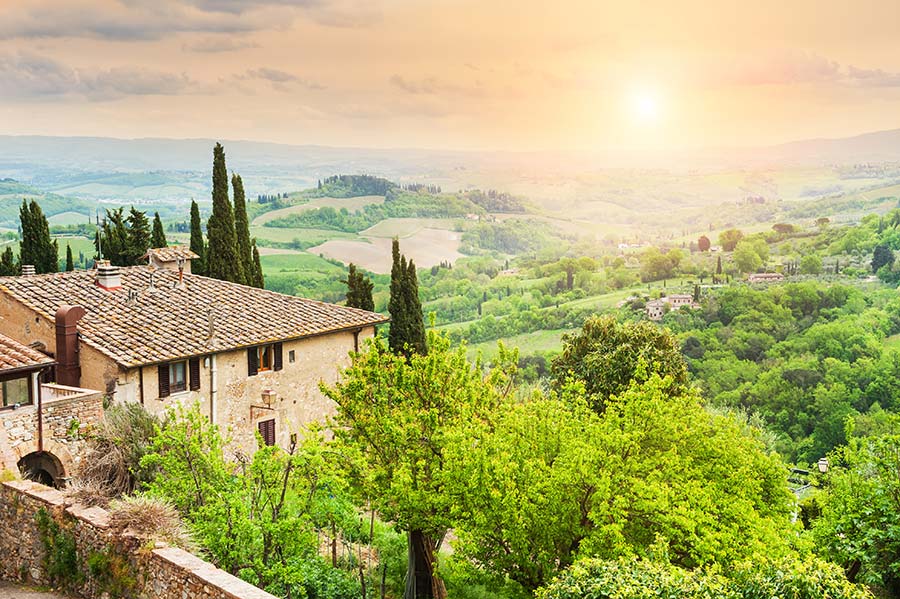Two years since my mother died, and my sense of doom is almost as heavy as the suitcase I drag along. The stones of the gravel track keep getting stuck in the wheels and wrong-footing me.
I’d put this off for too long. I haven’t been back since before the accident. My sister, Adriana came out to shut the place up but hasn’t been back since.
The house was ramshackle when mum and dad originally came here decades ago. I anticipate its state will be similar now, having been abandoned. After mom died, Adriana told me I could do what I wanted with it. The house has never interested her. She has three children and a husband in France. She rarely leaves. I’m amazed she offered to come out here and shut the house up. I still hold Addy partly responsible for the accident. Who lets a woman in her late seventies go skiing for the first time in her life? God knows what possessed my mother; maybe too much sedateness in Tuscany. No one is sure what happened, but she managed to fall off a chairlift. She died instantly and did not suffer. This information is imparted like it’s supposed to be a comfort. It’s not.
I think of my mother’s ashes in my suitcase. I have no idea what I am going to do with them.
‘Buona Sera, Signor.’
‘Christ!’ I drop the keys I’d just taken from my pocket. ‘Maria!’
‘So, you come at last.’ Maria looks at the house and then back at me, it’s not accusing, but it’s not far off. ‘Nobody comes since two years.’
‘I’ve been busy,’ I lie. ‘Come sta?’
‘I am well, but the house is not well.’
‘Your English is very good now,’ I say, attempting to deflect the guilt.
‘Si. I take job in Grossetto – Ufficio Touristico. I speak Inglese now very good.’
I laugh. ‘Indeed, you do.’
‘Today, I work on farm.’ She tucks stray black curls behind an ear, self- consciously. ‘The work, it is dirty. I am . . . ’ Maria looks down at herself and makes a face.
‘You look the same,’ I compliment her. ‘Bella.’ Good God, am I flirting?
Maria blushes, laughs, makes a joke about being old and grey I think, but her mother tongue is too quick for me and I am rusty in a language I used to
know so well. Her father comes to the farmhouse door, I nod at him. He looks at me with cold eyes. ‘Maria,’ he barks.
Maria turns to him, rattles off something in Italian. I recognise my name but not much else. In a low voice, like rumbling thunder he responds and stalks off.
‘I must go,’ Maria says, she crooks her head toward the farmhouse. ‘You stay how long for?’
I shrug. ‘Not long.’
‘The house, it needs life. It died with Signora Potter.’ Maria casts her eyes up the hill toward the house. The house looks sad; shuttered up like it encases its own grief.
A voice booms from an open window behind her. Maria turns her head and shouts back at the house.
‘Padre,’ she rolls her eyes as she turns to face me. ‘I must go. Ciao, Peter.’
I nod a farewell and when I bend to retrieve the keys, I notice the wooden sign for the house Casa Bianca. Brambles have twisted it to point at the sky. Perhaps it is seeking my mother, it’s heart.
Outside the heavy wooden door, I fiddle with the key finally hearing the click of the lock. The rusting hinges protest as I pull the door open and peer into the dark depth of the house. The night is drawing in and I know I must get in and find the stash of candles mum always kept for the frequent power cuts.
The place stinks of damp, dust and must. My eyes gradually become accustomed and I can just make out the grey stone steps that lead down to the kitchen. Forgetting how worn they’d got and how they dip in the middle, I slip halfway down, cursing and grabbing the metal handrail. It creaks but it holds my weight. At the bottom, a large picture window looks out onto what had once been a vegetable patch. A vine now almost completely occludes my view. Not that there is much to see, I imagine. I dread to think what the gardens look like now; the once carefully plotted and planted terraces ruined. I unlatch the kitchen door and remember just in time to duck under the low lintel as I step down into it. Using my mobile phone as a torch, I haul open stubborn dresser drawers and rummage for candles and matches. Grabbing a tray, I lay it out with saucers and teacups to act as candle holders and carry them upstairs.
Placing the tray on the floor outside the lounge, I light a candle and push open the door, which grates on the terracotta floor. On the mantelpiece and windowsill, I place and light more candles and shiver as the light quivers. The house is cold and eerie. I always felt this house had a presence, I don’t mean a ghost. Like Maria said, it had a life. I feel like an intruder; like the house resents my presence.
I glance around at the crooked pictures casting wonky shadows on white- washed walls. Generations of our family judge me from every angle.
‘All right,’ I say. ‘I’m here now.’
The only hotel in the town is fully booked, so I am forced to stay here. Feeling the cold seep into my bones, I zip up my coat and sit by the hearth. The fire basket still has wood and old newspaper in it. I lay kindle and do my best to make paper knots, and stack the logs on top. Soon a roaring fire blazes, the logs crack and spit as I haul in my suitcase and take out bread and cheese and beer I’d bought in the town. I sit grumpily on the rug in front of the fire with my meagre meal and lose myself in thoughts full of self-pity. The creak of the front door makes me jump and I spill beer on my jeans.
‘Peter?’ A familiar voice calls, hesitantly.
‘Maria? In here.’ I stand and open the lounge door, brushing bread crumbs from my clothes.
Maria hugs herself and shivers. ‘Freddo,’ she complains.
‘It’s warm in front of the fire, come in.’
Maria plonks herself on the rug, crosses her legs and pulls a bottle from inside her jacket. ‘Vino rosso.’ She smiles as she offers me the wine.
Una birra?’ I exchange the wine for a bottle of beer. She laughs and takes it. Her long black curls fall about her shoulders and her eyes twinkle in the firelight.
‘You eat like poor man.’ She indicates the food as she swigs the beer. ‘But you buy good beer.’
‘My Italian is so bad now. I can manage pane, formaggio and birra. I never intended to stay here. The hotel is full.’
‘Ah, because of the wedding. You will have a room tomorrow. You stay here tonight? You have no light, no heat? No water?’
‘No. It was all cut off – stopped – when Adriana came out to shut the place up. She was supposed to clear it out a bit, but . . . ’ I look around me and shrug. ‘Maybe she did other rooms.’
‘She was here only two days.’ Maria’s tone is hard. Disapproving.
‘I thought she came for a week?’
‘Perhaps three days. She put out many bags for rubbish. She put the shutters and she leave. I say I help her. She say is not her problem, is yours.’ Maria nods at me. ‘She say you come. I think maybe you come to live here. But you no come.’ Maria’s voice isn’t accusing, instead it is tainted with sadness and I feel a twinge of guilt.
‘I didn’t know what to do with the place, and life has been, you know.’ My pathetic excusing tails off and I look down at the rug, pick at the remains of the cheese.
‘Your wife, she no come with you? She did not like to stay here, I think.’
‘Sophie never felt at home here.’ Again, the guilt. Trips to see mum dwindling; reduced from a week to a long weekend a couple of times a year. ‘Anyway, she’s gone too.’
‘Dead?’ Maria crosses herself.
‘No,’ I laugh. ‘We divorced.’
‘Oh, still, I am sad for you.’
‘I’m not.’ I smile. I pass Maria another bottle of beer and stoke the fire.
We talk into the night as the light dies and candles burn low. Melting into the darkness, we reminisce about our childhood spent playing in the woods where imagination overcame language barriers.
Wrapped in fading candlewick bedspreads, huddled together we finish the wine. Woozy from the alcohol and heat of the fire, Maria lays her head in the crook of my arm and I stroke her hair. Her English becomes more pickled as she does, and she softly spouts slurred Italian with English words interspersed until she falls asleep. I curl up around her and gaze up at the wooden beams. We had been close friends into our teens, being just a few years different in age. I reached my teens, went to university and met Sophie. I think Maria’s dad had expected more of me.
The room slips into total darkness as the candles die and I drift off to sleep with guilt, remorse, and thoughts of what might have been.
Woken by the dawn chorus, we stretch our cold, stiff bodies. I rise and open the front door as Maria continues to wake. The chilly air makes me shiver. The misted garden appears horrifically overgrown; roses battle with weeds and brambles attempting to choke the life out of them. Some have declared war on the shutters, maiming them with open wooden wounds. I circle the house and yank open the working shutters then return to view the inside of the house in the cold light of day. Dust motes dance in the early morning sunlight. Dead bugs litter the floor. Heaven knows what we slept with or on. Across the beamed ceiling, degraded webs hang like abandoned spider trapezes.
Maria stands, her hair tousled, her arms crossed over her chest, her gaze challenging. ‘I do not think you sell it,’ she states.
‘Maria, I . . . ’
She holds up a hand, takes a step toward me. ‘Last night we talk. We say many, many things. I ask you just this: think for some time. Come again in summer. Stay. I telephone for gas and . . . ’ she waves a hand to indicate she will sort the utilities out. ‘Stay for two weeks, then tell to me you have no heart for this house.’
I sigh, torn. She waits, moves her hands to her hips, starts tapping her foot.
‘There’s just so much to do, I don’t know.’
‘I help. I clean good. I am strong worker,’ she says as she laughs and flexes her arms.
‘It’s not just the house. There’s the fields and . . . ’ I can’t look at her. ‘I know it sounds like I’m making excuses. I just think it’s easier to sell the whole lot.’
‘I know man to buy fields. He keeps sheeps on one of your fields already, you should make him pay. So, he buy fields. Then you have only the house.’
I look up and smile at her determined face and flashing eyes. It’s so simple to her. She reminds me a bit of an olive-skinned Wonder Woman. I had a crush on Wonder Woman as a kid. I stop myself imagining Maria in that outfit.
‘I’ll think about it,’ I concede.
Maria approaches me and strokes my face. She smiles and the light in her eyes dim. My heart contracts as though her woefulness had entered my bloodstream and slowed my heartbeat.
‘Today, the house is sad for you. You had happy days here. Your mouth tells to me you want to sell. Your eyes do not say this to me. Do not put for sale. Go home. Think. Come back. Si?’
I reach up and catch her hand and look deep into her eyes, ‘Si.’
Maria releases my hand and steps back, she smiles triumphantly and her eyes are rebooted into bright life. I feel I could never win an argument with this woman. I clear my throat, scan the room, scuff the floor with my shoe.
‘I’ll do some work here, you know tidying and I’ll come back in the summer. There’s too much to do anyway on this trip, so I’ll have to come back again.’
‘Si,’ Maria says with a note of finality. She tilts her head and grins at me, her eyes flash triumphantly. Whatever logic there is in selling the house flies out of the unshuttered window.
Later, I stand on the hilltop overlooking the house and scatter my mother’s ashes. They take flight and settle, I like to think, on her once beloved garden below. I survey the stubborn house and grounds, determined to go on regardless. It will not be beaten.
A whisper on the ashen wind is beckoning me.
‘I’ll be back in the summer,’ I promise.

Amanda Staples is a Clinical Hypnotherapist, who specializes in anxiety and depression. She is fascinated by emotions and the working of the mind (with a minor obsession with death). Staples has completed novel and is seeking publication while working on a second. She has had several short stories published, broadcast or placed in competitions and has a one act play going into production. She lives in Bristol with her husband and two anthropomorphised dogs.

5 Questions withAmanda Staples:
TD: Tell us a little about this story? Where did the idea come from?
AS: The story is inspired by an old house I rented in Tuscany for a holiday that was on a hill. It was owned by an English family but was lacking regular use. It got me thinking about what would happen to it if it was left to family members that didn’t want it.
TD: Who is your greatest writing influence?
AS: It depends what mood I’m in when you ask me this. It could be Austen, Wodehouse or Wilde, Alan Bennett or Diane Chamberlain. Flipping the coin will give you Deaver, Peter James, Agatha Christie, Steven King or Steinbeck. And that’s the short list!
TD: What is your favorite place to write and why?
AS: I like to write in my summerhouse. I like to be outside but be tucked away. My dogs often join me. I like to write longhand before typing and I have an antique ladies writing desk shown in the photo, which sits on my lap.
TD: Favorite word?
AS: I like words that sound poetic and musical when they trip off the tongue, like hyperbole or onomatopoeia.
TD: Do you have a favorite reading ritual?
AS: My reading ritual is always with tea, preferably a pot. I drink many different rooibos or fruit infusions. My husband would argue my favourite word is tea.




Rachel
9 June
Amazing short story I really want to find out more! I can close my eyes and imagine seeing the house and the characters in it.
Catherine Smart
10 June
I want to read the rest, I was hooked from the first paragraph!
Tina Christmas
10 June
Amanda’s writing draws you in from the first paragraph, and you are right there with the characters empathising with their situation. It is a real skill to be able to get so much across in such a short story and yet she always leaves the reader longing for more. Bravissimo!!!
Pat Jefferis
10 June
Amanda you have done it again .Straight away you capture your readers.Transporting them to the lives and world of Tuscany.Brilliant writing ,can’t wait to hear more of the story.
Alison Peacock
10 June
Lovely short story, I just wanted to keep reading. I felt I was an observer in the room, so engrossed. I would definitely like to read more books by Amanda Staples.